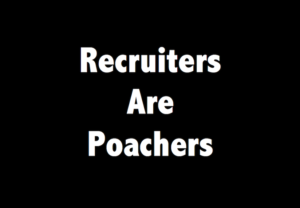Who is Calling the Recruiter a Poacher?
Websters dictionary defines poachers as “Someomeone who trespasses or steals”. While I believe that today’s hiring process is broken and many members of the recruiting community would benefit from a simple lesson in ethics, it is virtually impossible for any recruiter to “steal” an employee.
In my experience, the label of poacher has been given to recruiters by weak and ineffective business leaders. Recruiters are only poachers in the minds of the business leader who believes that he or she holds some ownership of their employee.
This is not about recruiting. The suggestion that recruiters are poachers is really a leadership issue !
Today’s At Will Workplace
The capitalistic model of today’s workplace states that an employer can choose to end the employment relationship and the employee can choose to leave their employment.
While hiring critical talent is not easy, leaders hold the responsibility to motivate their team members and provide a purpose and a reason for employees to want to contribute to their organization. The role of a CEO or business leader is a difficult one. But, leaders need to be leading their organization.
If today’s workforce were to be divided into one of two parts, one part would be glued to their job and the other part would be loosely connected to their job. The companies that have most of their employees glued to their job are the companies that practice good leadership everyday and are ahead of their competitors.
I have been at events where a CEO approached me and said: “Don’t poach my people”. My response was: “I am not your problem. You probably need to look in the mirror. If your employees are loosely connected to their job, they are just waiting for a better opportunity. Ask yourself what are you doing everyday that makes your employees want to come to work”.
The New Normal Combined with True Leadership
There was a time when employees retired from the same employer after 30 years. Today’s new normal is every 3-5 years an employee changes jobs. Sometimes, it’s an even shorter period than that. The new normal is that rarely can a leader expect to have the services of an employee for 30 years.
Knowing that turnover is almost a certainty, leaders should be continuing to develop existing talent and continuing to acquire critical talent. The really great employees are going to be offered a higher compensation and a compelling career path that your business can’t compete with.
The new normal combined with true leadership is:
– Understand that employee turnover is an almost certainty
– This also means that it should be easier for your company to acquire talent, since the supply side is active
– As a true leader, encourage your employees to grow and pursue their ambitions. They are going to do it, with or without your support.
– By supporting them, you will be more likely to know that they may be considering another employment opportunity and you will therefore be less likely to be surprised by their departure and have to replace them in a reactive mode.
– By supporting their ambitions as a true leader, you will have the basis for a long term relationship with great talent.
– The key point is that they don’t have to be your employee in order for them to be valuable to you. If your have been a selfless leader, your ex-employee might become your best customer or your best supplier or your best advocate in your business sector.
If you have adopted the philosophy of this new normal, it would be impossible to think of the word poaching as it relates to the employees working at your organization.
Good hunting

